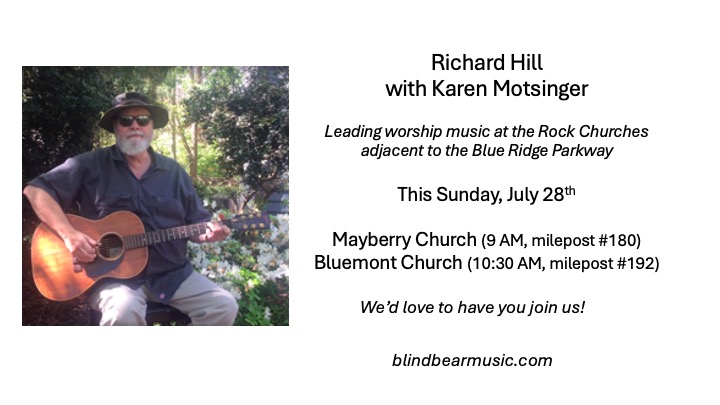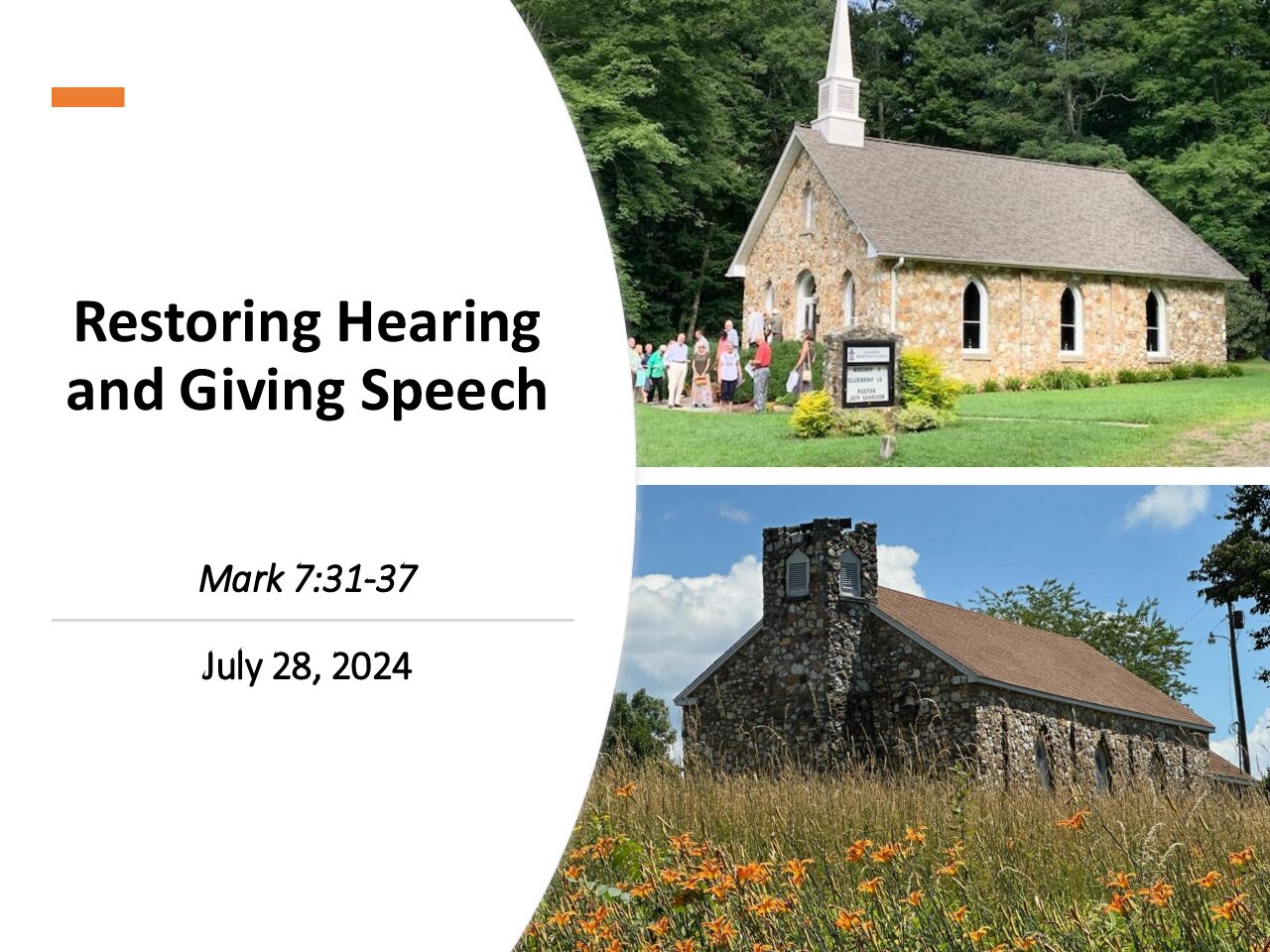Jeff Garrison
Mayberry & Bluemont Churches
July 28, 2024
Mark 7:31-37
At the beginning of worship:
This Wednesday, at Bluemont, there will be a revival service. It’s at 7 PM, followed by a time of fellowship with cobbler and ice cream. We invite you to come and to bring friends. I promise, we won’t draw-out the hymns while we encourage people to come forward during an altar call or any such emotional string pulling. Emotional string pulling isn’t for us to do, that’s the work of the Holy Spirit.
But we do have work to do when it comes to making converts for Jesus. We tell his story. And we set the stage by making people feel welcomed and loved, which sets the stage for the Holy Spirit to move in our midst. Borrowing from another pastor, this morning I offer four suggestions on how we might do this:
The Ten Feet Rule: If you come within ten feet of another person, make eye contact, smile, and say “hello” (whether you know the person or not).
The Three Minute Rule: Immediately following the worship service, use the first three minutes to seek out someone you do not know and introduce yourself.
The Two Person Rule: No one should be left standing or sitting alone. If you see someone like this, sit on the same aisle or stand and talk with them.
And then, item #4, probably the hardest suggestion to adopt.
The Front and Center Rule: Regular long-term members should sit in the center of a pew and toward the front. This leaves room at the ends of the pews and in the back for our guest. Instead of things being what makes us most comfortable, it should be what makes our guest feels comfortable.[1]
It all boils’ downs to this; it’s not about us. Church is not about us. We are here because we are followers of Jesus. As in our story today, Jesus has opened our ears to his word and our tongues to praise him. We’re to do is for his glory and to draw other people to him. So instead of focusing on ourselves, Jesus calls us to focus on others. What do they want and need? What will make them comfortable enough to seek Jesus?
Before Reading the Scriptures:
Last week we saw that Jesus had left the area around the Sea of Galilee, which is after all just a big lake. He traveled overland to a real sea, the Mediterranean. This territory is beyond the traditional boundaries of Israel. The people are Gentiles and pagans. But even here, Jesus’ reputation precedes his arrival. People want to see him such as the woman we met last week.
In this section of Mark, Jesus wears his walking sandals. After having walked from Galilee to the Mediterranean Sea, in our reading today, he heads to the Decapolis, the region of the ten cities which is on the Gentile side of the Sea of Galilee. But instead of taking the direct route, which would have cut across Galilee, Jesus travels a circular route, heading north and then across the land, before heading south. It’s approximately 120 miles.[2]
Mark doesn’t give us a reason why Jesus took this route. But we can speculate. Maybe Jesus was still looking for a break from the crowds who had hounded him in Galilee. Or maybe he wanted to avoid a premature encounter with Herod, the ruler of the region whom we learned a couple weeks ago, has Jesus on his radar.[3]
Whatever the reason, in our reading today, we find Jesus back in the territory in which he’d been shooed away from after giving release to the man with a legion of demons.[4] While he helped the man, allowing him to live a normal life, most people were frightened by his power and wanted nothing to do with him. This time, however, Jesus seems to be welcomed for they bring a man who has lost the ability to hear and speak. Let’s listen:
Read Mark 7:31-37
This is one of two miracle stories found in Mark’s gospel that’s not found in either Matthew or Luke. The second miracle story is in the next chapter, so we’ll look at it in a few weeks. There, Jesus heals a blind man. Mark has told us stories of Jesus healing and freeing people from demons, as well as raising the dead and controlling the weather. While I have suggested over and over in our journey through his gospel that Mark wants to establish the divinity of Jesus, here he establishes key criteria of Jesus’ Messiahship.
In Matthew’s gospel, we’re told that when John the Baptist was in prison, he began to wonder and doubt. Maybe he became discouraged. So, he sends his disciples to Jesus to see if Jesus is the Messiah. Drawing on the prophets, Jesus tells John’s disciples: “Go and tell John what you hear and see: the blind receive their sight, the lame walk, the lepers are cleansed, the deaf hear, the dead are raised, and the poor have good news brought to them.”[5] Jesus fulfills part of that call in this passage.
We also should ponder if those who have brought this man to Jesus thought he’d be healed. Instead of asking for a healing, they ask Jesus to lay his hands on the man. While laying on of hands may resort in healing, it was also something done as a blessing.[6]
After all, there have been many times when everyone knew someone was about to die that I would anoint them with oil and then have elders and family lay hands on them as we pray. In other words, you lift them up and place them into God’s hands.
Instead of oil, Jesus uses spit. For us, that might seem nasty or weird. I’ve certainly never used spit. Even in the Old Testament, such fluids were to be avoided. But in Jesus’ day, it appears to have been common for some healers to use such bodily fluids. It seems odd that Jesus, who in the previous story freed the young girl from a demon without even saying something or seeing her, employs such theoretics. However, as we’re told in the text, Jesus doesn’t do this in front of the crowd, but in private.[7] Also, here, Jesus appears to call upon heaven for help. And the man’s ears open and his tongue is freed. He can communicate again.
While Jesus tells them to tell no one, they proclaim Jesus’ greatness. That last line is a winner. “He has done everything well; he even makes the deaf to hear and the mute to speak.
This passage is one that we can all place ourselves into, at least metaphorically.[8] We need our ears opened, so that we might hear and understand the words of Jesus. For unless the Holy Spirit, often through another person, opens scripture for us, we are lost.
We need to have our ears opened (or maybe the wax cleaned from them, so that we might hear what Jesus has to say to the world. And once we hear, our tongues need to be freed so that we might be a witness to Christ.
No longer does Jesus have to worry about keeping himself secret. The powers of this world have done all they can to him, and he still lives and reigns in power. We, his church, are to follow him, showing his love and proclaiming his grace. Like the man in the story, pray that we might hear what Jesus wants us to hear and that our tongues might be freed so we can share with others what Jesus has done for us. Amen.
[1] This came from the Reverend James Gerling. I don’t remember where I found it.
[2] James R. Edwards, The Gospel According to Mark (Grand Rapids, MI: Eerdmans, 2002), 223-224.
[3] Mark 6:14-15, see https://fromarockyhillside.com/2024/06/23/the-death-of-john-the-baptist/
[4] Mark 5:1-20. See https://fromarockyhillside.com/2024/06/02/jesus-and-the-man-living-in-the-tombs/
[5] Matthew 11:4-5.
[6] William L. Lane, The Gospel of Mark, (Grand Rapids, MI: Eerdmans, 1974), 266.
[7] Jesus may have done this privately in order not to be seen as a miracle worker in front of the crowds. Lane, 268.
[8] See Douglas R. A. Hare, Westminster Bible Companion: Mark (Louisville, KY: WJKKP, 1996), 88.



I like the rules. Never leaving someone standing alone is a good one.
Yes, if we were just more concerned about others, we would be a lot more Christ-like.
Those are tough rules, Jeff. Good ones, doubtless, and ones I’d struggle with.
Tough but worthy to attempt to follow
Interesting, innovative rules 🙂
Yep! Maybe instead of rules, we should call them suggestions, make it less legalistic.
I enjoyed all your opening words, including the “rules” (that I’ll admit I’m not good at). I especially like what you said about the work of the Holy Spirit.
Thanks. I think the Holy Spirit is often shortchanged in those of us in the Reformed Tradition.